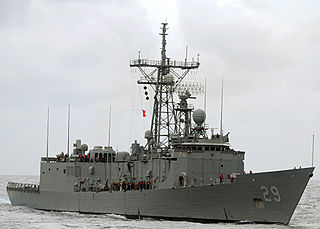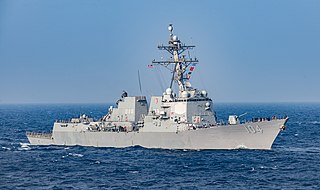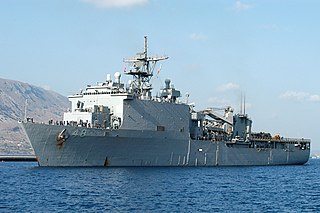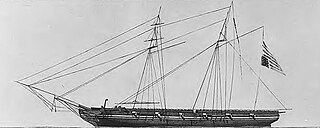See also
- Pirate (steamboat), an expeditionary supply vessel that sank in 1839.
USS Pirate has been the name of more than one United States Navy ship, and may refer to:

USS Winston S. Churchill (DDG-81) is an Arleigh Burke-class destroyer of the United States Navy. She is named after Sir Winston Churchill, former Prime Minister of the United Kingdom. This ship is the 31st destroyer of her class. Winston S. Churchill was the 18th ship of this class to be built at Bath Iron Works in Bath, Maine, and construction began on 7 May 1998. She was launched and christened on 17 April 1999. On 10 March 2001, she was commissioned during a ceremony at Town Point Park in Norfolk, Virginia.
USS Lexington may refer to the following ships of the United States Navy:
USS Liberty may refer to:
USS Dolphin may refer to:

USS Antrim (FFG-20) was the twelfth ship of the Oliver Hazard Perry class of guided-missile frigates. She was named for Rear Admiral Richard Nott Antrim (1907–1969). Ordered from Todd Pacific, Seattle, Washington on 28 February 1977 as part of the FY77 program, Antrim was laid down on 21 June 1978, launched on 27 March 1979, and commissioned on 26 September 1981.

USS Stephen W. Groves (FFG-29), twenty-first ship of the Oliver Hazard Perry-class of guided missile frigates, was named for Ensign Stephen W. Groves (1917–1942), a naval aviator who was posthumously awarded the Navy Cross for his heroism at the Battle of Midway during World War II.

USS Bulkeley (DDG-84) is an Arleigh Burke-class destroyer in the United States Navy. She is named for Medal of Honor recipient Vice Admiral John D. Bulkeley. This ship is the 34th destroyer of its class. USS Bulkeley was the 15th ship of this class to be built at Ingalls Shipbuilding in Pascagoula, Mississippi, and construction began on 10 May 1999. She was launched on 21 June 2000 and was christened on 24 June 2000. On 8 December 2001 she was commissioned during a pierside ceremony at the Intrepid Sea, Air and Space Museum in New York City, New York.

USS Sterett (DDG-104) is a Flight IIA Arleigh Burke-class guided missile destroyer of the United States Navy.

USS Halyburton (FFG-40), an Oliver Hazard Perry-class frigate, is a ship of the United States Navy named for Pharmacist's Mate Second Class William D. Halyburton, Jr. (1924–1945). Halyburton was posthumously awarded the Medal of Honor for his heroism while serving with the 5th Marines, during the Battle of Okinawa in 1945.

USS De Wert (FFG-45), an Oliver Hazard Perry-class frigate, was a ship of the United States Navy. She was named for Hospitalman Richard De Wert (1931–1951). De Wert posthumously received the Medal of Honor for his heroism while serving with the 7th Marines during the Korean War.

USS Ashland (LSD-48) is a Whidbey Island-class dock landing ship of the United States Navy. She was the second Navy ship to be named for Ashland, the home of Henry Clay, in Lexington, Kentucky.
USS Oneida has been the name of more than one United States Navy ship, and may refer to:
USS Shad has been the name of more than one United States Navy ship, and may refer to:

USS Bainbridge (DDG-96) is an Arleigh Burke-class guided missile destroyer in the United States Navy. She is the fifth ship to carry that name, and the 46th destroyer of a planned 75-ship class. Bainbridge is named in honor of Commodore William Bainbridge, who as commander of the frigate USS Constitution distinguished himself in the War of 1812 when he and his crew captured HMS Java, a 38-gun fifth-rate frigate of the Royal Navy.
USS Edith may refer to the following ships of the United States Navy:
USS Mist has been the name of more than one United States Navy ship, and may refer to:
USS Patrol, usually but not always followed by a numerical designation, has been the name of more than one United States Navy ship, and may refer to:
USS Josephine has been the name of more than one United States Navy ship, and may refer to:

The West Indies Anti-Piracy Operations refer to the United States Navy presence in the Antilles, and surrounding waters, which fought against pirates. Between 1817 and 1825, the American West Indies Squadron constantly pursued pirates on sea and land, primarily around Cuba and Puerto Rico. After the capture of Roberto Cofresi in 1825, acts of piracy became rare, and the operation was considered a success, although limited occurrences went on until slightly after the start of the 20th century.